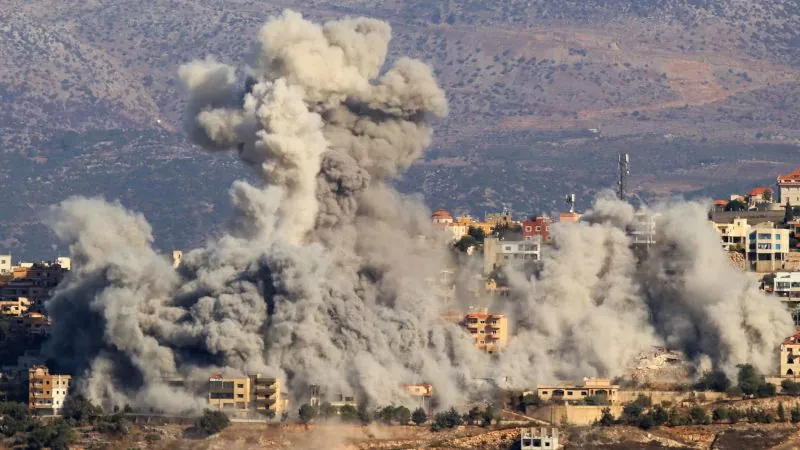
Breaking News: Escalating Violence as Israel Strikes Lebanon Amid Iran Concerns
2024-10-05
In a shocking series of developments, Israeli airstrikes targeted southern Lebanon, prompting urgent evacuations and raising alarm over the growing humanitarian crisis.
State media reported that a strike near the Martyr Salah Ghandour Hospital in Bint Jbeil has left nine medical staff injured, some in grave condition. This strike came after an evacuation order was issued by the Israeli military, which claimed the facility was being used by Hezbollah.
The Israeli Defense Forces (IDF) announced that they targeted a mosque close to the hospital, allegedly serving as a Hezbollah command center. Israel's military emphasized its adherence to warnings, asserting it had informed local residents of the impending strike.
As Israel escalates its campaign against Hezbollah, the repercussions on Lebanon's healthcare system have become dire.
Reports from the World Health Organization confirmed that the bombings have forced 37 health facilities to close in southern Lebanon, with at least 28 healthcare workers reported killed within a mere 24 hours.
Dr. Ghassan Abu-Sittah, a British-Palestinian surgeon, criticized Israel's actions as a “war on children,” linking the suffering of young victims in Lebanon to the ongoing crisis in Gaza. UNICEF’s latest figures reveal more than 690 children in Lebanon injured in recent weeks, with at least 100 fatalities in just over a week.
Israel defends its operations as necessary measures to combat Hezbollah, but human rights organizations argue these strikes violate international humanitarian law.
Despite claims of efforts to minimize civilian casualties, many activists argue that such warnings do not negate the obligation to protect innocent lives.
The situation in Lebanon has led to unprecedented displacement, with over 200,000 people fleeing into Syria amidst the ongoing onslaught.
The UN's High Commissioner for Refugees, Filippo Grandi, noted both Lebanese nationals and Syrian refugees living in Lebanon are among those escaping violence. More than 1.2 million people within Lebanon have reportedly been displaced, many finding refuge in makeshift camps or on the streets.
Reports indicate a severe lack of access to clean water, impacting hundreds of thousands following strikes on critical infrastructure. Relief organizations, including Relief International and the Syrian Red Crescent, are scrambling to provide support at border crossings, but conditions remain dire.
In a marked response, Hezbollah announced it successfully targeted an Israeli tank during its advancement near the village of Maroun and repelled Israeli forces attempting to breach the town of Adaisseh.
Casualties on both sides appear to be rising, with Israel suffering losses from drone attacks said to be launched by Iranian-backed militias.
Simultaneously, Israel confirmed that two of its soldiers from the Golani Brigade were killed by a drone attack, increasing fears of a broader regional entanglement as Iran’s influence looms large amidst escalating tensions.
The Biden administration has expressed concern about the humanitarian impact of the conflict while supporting Israel’s military operations.
Secretary of State Antony Blinken announced almost $157 million in U.S. humanitarian assistance to those affected by the conflict in Lebanon, a clear acknowledgment of the dire situation facing civilians.
As the conflict continues to intensify, the international community is bracing for further fallout. With Hezbollah facing leadership challenges following the assassination of its chief, Hassan Nasrallah, the group’s future direction remains uncertain—leading to whispers of a more clandestine operational approach in the face of heightened Israeli incursions.
As tensions escalate, analysts are watching closely to see if this regionally destabilizing conflict could trigger broader military responses, particularly aimed towards Iran, escalating the already fragile situation in the Middle East.
The ongoing violence in Lebanon, alongside the backdrop of increased military engagement from both Israel and Hezbollah, serves as a stark reminder of the protracted human toll of conflict—a tragedy that grows by the hour.


 Brasil (PT)
Brasil (PT)
 Canada (EN)
Canada (EN)
 Chile (ES)
Chile (ES)
 España (ES)
España (ES)
 France (FR)
France (FR)
 Hong Kong (EN)
Hong Kong (EN)
 Italia (IT)
Italia (IT)
 日本 (JA)
日本 (JA)
 Magyarország (HU)
Magyarország (HU)
 Norge (NO)
Norge (NO)
 Polska (PL)
Polska (PL)
 Schweiz (DE)
Schweiz (DE)
 Singapore (EN)
Singapore (EN)
 Sverige (SV)
Sverige (SV)
 Suomi (FI)
Suomi (FI)
 Türkiye (TR)
Türkiye (TR)